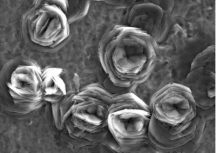A rose garden on titanium surfaces
Time:2021/03/02 Pageviews:30 Share:
 While carrying out research to optimize multiscale surface roughness for implantology applications, a team of researchers from Liberty University (LU), Lynchburg, Virginia, USA, led by Dr. Hector Medina unexpectedly discovered a new surface formation on titanium specimens. This previously unobserved structure consists of rosette-like formations with “petals” that possess thickness in the nanosize scale.
While carrying out research to optimize multiscale surface roughness for implantology applications, a team of researchers from Liberty University (LU), Lynchburg, Virginia, USA, led by Dr. Hector Medina unexpectedly discovered a new surface formation on titanium specimens. This previously unobserved structure consists of rosette-like formations with “petals” that possess thickness in the nanosize scale.The discovery was made via scanning electron microscopy of titanium specimens that had undergone etching using sulfuric acid at temperatures between 60 to 90 °C. Dr Medina’s team was firstly amazed when they saw the micrographs presented by Rachel Kohler, who back then was a mechanical engineering student at LU (now a graduate student at Purdue University). “I thought I was looking at a black-and-white picture of a garden,” said Dr. Medina.
Whilst the practical implications and further understanding of this discovery are to be explored and will be the subject of future studies, the first preliminary results, which have recently been published in Engineering Reports, may have implications in corrosion science, manufacturing of titanium-based implants, and in the science of fluid-surface interactions.
The novel formations exhibit physical characteristics that resemble flowers. Not only does this make them aesthetically fascinating, but it also represents an ideal feature for applications in certain processes where chemical reactions in fluids are assisted by surface chemistry, and enhanced by surface roughness.
Novel rosette-like formations may open new opportunities in corrosion science, manufacturing of titanium-based implants, and fluid-surface interactions.
Source: advancedsciencenews.com


 Chinese
Chinese English
English


